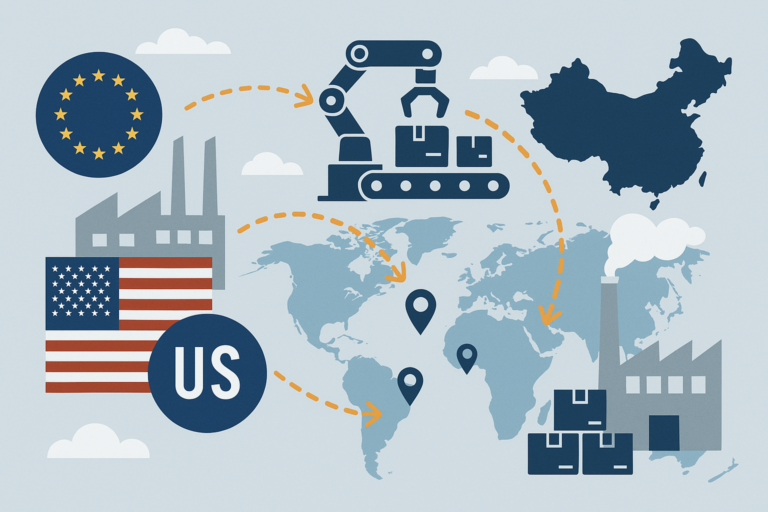A strategic wave of reindustrialisation is sweeping across Europe and the USA, as large manufacturers respond to ongoing supply chain volatility, geopolitical friction and rising tariffs, according to a new report.
The report, The Resurgence of Manufacturing: Reindustrialization Strategies in Europe and the US – 2025, by the Capgemini Research Institute, finds that two-thirds of US and European organisations now have an active or in-progress reindustrialisation strategy – up from 59% in 2024 – with 73% of executives identifying ‘friendshoring’ as a key component of future sourcing and production plans.
Reindustrialisation – defined as the reshoring, nearshoring and diversification of manufacturing and supply chain capacity – is being strategically prioritised over short-term profitability.
Capgemini’s survey of 1,400 senior executives across 11 countries and 13 sectors revealed that 82% of organisations plan to reduce their reliance on Chinese supply chains, with friendlier destinations such as Mexico, Vietnam, India, North Africa and Eastern Europe gaining ground.
Manufacturing closer to home is expected to increase. Onshoring is forecast to account for 48% of manufacturing capacity within three years (up from 41%), while nearshoring will rise to 24%. Offshore manufacturing, meanwhile, is set to fall from 37% to 28%.
Supply chain resilience remains the dominant driver for reindustrialisation, cited by 95% of executives – a sharp rise from 69% in 2024.
Other key motivators include the need to be closer to customers (92%), geopolitical risk (90%) and reducing logistics costs (80%).
Additionally, 93% of executives expressed concerns about the impact of global trade wars, with more than half saying that tariffs are accelerating reshoring strategies.
Despite the higher costs associated with these efforts – including anticipated rises in capital, labour and energy expenses – 59% of business leaders said they are committed to continuing their reindustrialisation journey.
More than US$4.7tn is projected to be invested over the next three years in reindustrialisation initiatives, a jump from US$3.4tn in 2024.
READ MORE: US DOE unveils US$13m initiative to modernise manufacturing and strengthen supply chains
Crucially, the report highlights the enabling role of digital and advanced technologies. More than half (54%) of respondents have already realised more than 20% cost savings through technology adoption, and 84% plan further investment in areas such as AI, digital twins, 5G and cloud.
Sustainability goals are also increasingly integrated into reindustrialisation strategies, with 73% of executives saying the shift will help drive eco-friendly production and reduce emissions through shorter supply chains and cleaner energy.
The report cites several case studies: HP is building manufacturing hubs outside China in Mexico, Vietnam and Thailand; Apple has committed more than US$500bn to US-based facilities; while Volvo, facing EU tariffs on Chinese EVs, is relocating EV production to Belgium.
Aiman Ezzat, CEO of Capgemini, said: “After decades of globalisation, the imperative to reindustrialise is clear. Organisations are intensifying efforts to de-risk and diversify their supply chains by embracing proximity, friendshoring and advanced technology.
“A resilient manufacturing ecosystem will require strong regional collaboration between industry, technology providers and policymakers.”
For logistics leaders, the implications are vast – from shifting sourcing strategies and regional warehousing requirements to new investment in automation, sustainability tech and digital infrastructure.
As cost, resilience and autonomy become the new metrics for competitive advantage, the logistics sector must prepare to operate in a fundamentally restructured global landscape.
As US manufacturers accelerate reindustrialisation strategies to reduce reliance on offshore production and strengthen regional resilience, IntraLogisteX USA 2025 offers a vital platform to explore the technologies enabling this transformation. Discover cutting-edge solutions for nearshoring, friendshoring and domestic supply chain optimisation – from real-time monitoring tools and AI-powered logistics to smart manufacturing systems and robotics – all under one roof at the Miami Beach Convention Center, Florida, on September 17-18.







